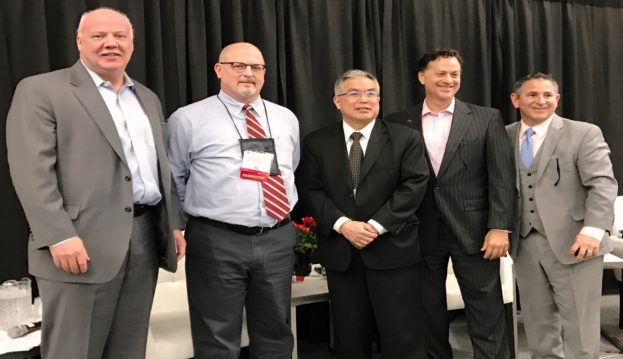
This year the FDAImports.com Government panel at Seafood Expo North America in Boston was again well attended, well reviewed and full of lively dialogue about where the Food & Drug Administration and U.S. Customs & Border Protection are going with respect to investigating imported seafood and enforcing U.S. laws, regulations and requirements. But it didn’t stop there. Panelists also spoke about POLICY under the new Trump Administration — though not officially of course.
After the historic election of President Donald Trump, Benjamin L. England, Founder and CEO of FDAImports and Benjamin L. England & Associates, LLC, was already on record saying that the new administration did not have to re-negotiate or even re-interpret any trade agreements to have an impact on international trade.
“All the federal agencies have to do is step up their investigative roles and focus existing resources on likely problem areas involving high value imported goods. Increasing the number of Requests for Information, inspections and examinations and focusing on high value products where there could be country of origin or complex regulatory compliance questions gives Customs and FDA access to high value importation bonds and costly penalty actions. No new legislation, rule writing or trade negotiations are necessary — and the Administration can be selective as to which foreign sources and commodities it wants to emphasize.”
There was no disagreement from the FDA or Customs officials on the panel with this premise
During the panel Mr. England focused on the direction FDA would be taking in seafood inspections, the impact of new HACCP regulations, the signs to watch for indicating Customs and/or FDA may be targeting an imported shipment for something more than just random curiosity, and exactly where to expect this new Administration to go even without renegotiating treaties.
For this year’s Government Forum Panel we hosted:
- Jeffrey Nii, Director of the Inter-Agency Collaboration Division in CBP’s Office of International Trade — who spoke about Customs’ implementation of the Automated Commercial Environment,
- Troy Petrillo, Supervisory Consumer Safety Officer and Import Program Manager in New England’s District Office of FDA, who spoke on FDA’s use of PREDICT and other investigative tools to find problems with imported seafood,
- Domenic Veneziano former FDA Director of DIO and Principal, Veneziano Consulting LLC, who talked about the re-organization of FDA’s Office of Regulatory Affairs (the enforcement arm of the agency), and
- Peter Quinter, Former Customs attorney and Chair of Customs & International Trade Law Group, GrayRobinson, P.A., who spoke about the interaction of new National Marine Fisheries regulations and government investigations of fraud in the seafood industry.
Regarding the new government policies affecting imported and exported seafood, “Rhetoric, it turns out, is awfully hard to regulate — much less enforce. Nevertheless, we are already seeing federal agencies increasing their use of inspection, examination and investigation authorities to probe where there is likely insufficient documentation to support certain beneficial declarations… such as origin in relation to FTAs, or HTS codes that have more favorable duty rates but are of questionable applicability,” explains Mr. England.
Customs and FDA are looking. Having the procedures and documentation in place, in advance, to respond accurately and within time frames will be very important to successfully fending off these inquisitions.

